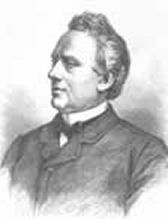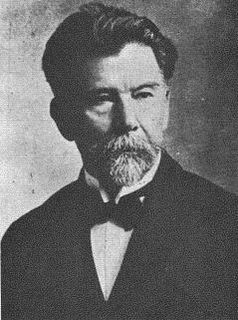Glengarry was a federal electoral district represented in the House of Commons of Canada from 1867 to 1917, and from 1925 to 1953. It was located in the province of Ontario. It was created by the British North America Act of 1867, and consisted of Glengarry county.

Hubert Joseph Walthère Frère-Orban was a Belgian liberal statesman.
The Leominster by-election was a by-election held on 15-16 February 1876 for the British House of Commons constituency of Leominster in Herefordshire.

Count Gedeon Ráday de Ráda was a Hungarian soldier and politician, who served as Minister of Defence from 1882 until his death. As a soldier he took part in the Second Italian War of Independence and the Austro-Prussian War. He also fought in the Battle of Königgrätz. Between 1862 and 1865 he was the adjutant of Emperor Franz Joseph. From 1875 Ráday was a representative of the Independent Party but later joined to the Liberal Party. After the unexpected death of Béla Szende he was appointed as Minister of Defence, but similarly to his predecessor Ráday also died under his office holding. His son was Gedeon VII Ráday who became Interior Minister during the Regency.

Tamás Péchy de Pécsújfalu was a Hungarian nobleman and politician, who served as Minister of Public Works and Transport (1875–1880) and as Speaker of the House of Representatives (1880–1892). He also functioned as Inspector of the Lutheran Diocese of Tisza from 1876 to 1897.

Benjamín Herrera was a Colombian politician and general. Born in Cali, Colombia in 1853. In 1875, while he was a student at the University of Cauca, Herrera joined the liberal army under César Conto to topple the conservative governor of Antioquia. He fought in the civil war for a decade until 1885, when the liberal forces were defeated and he decided to settle down in Pamplona, Colombia. In 1895 he returned to the political scene, gaining resources for a new liberal army against a new conservative governor. In the Thousand Days' War he became the main military strategist on the liberal side of the war, and, second to Rafael Uribe Uribe he became the main figure of Colombian liberalism. After the war, in 1905, he was elected to the Chamber of Representatives of Colombia. In 1905 and early 1906, he commanded the Colombian army forces confronting Venezuela, In 1909 Herrera became a senator, and in 1914 he became Minister of Agriculture under the government of Jose Vicente Concha. In 1922 he was the presidential candidate for the Colombian Liberal Party. He founded the Universidad Libre in 1923. Herrera died in 1924.
The West Suffolk by-election of June 1875 was fought on 16 June 1875. The by-election was fought due to the death of the incumbent Conservative MP, Lord Augustus Hervey. It was won by the Conservative candidate Fuller Maitland Wilson.
The West Suffolk by-election of 1875 was fought on 4 October 1875. The byelection was fought due to the death of the incumbent Conservative MP, Fuller Maitland Wilson. It was won by the unopposed Conservative candidate Thomas Thornhill.
The East Aberdeenshire by-election of 1875 was fought on 22 December 1875. The byelection was fought due to the death of the incumbent Liberal MP, William Dingwall Fordyce. It was won by the Liberal candidate Alexander Hamilton-Gordon.
The Horsham by-election of 1875 was fought on 17 December 1875. The byelection was fought due to the resignation of the incumbent Conservative MP, William Vesey-FitzGerald, who became Chief Charity Commissioner for England and Wales. It was won by the Liberal candidate Robert Henry Hurst (junior). who had previously been MP for the seat but was defeated at the previous General Election.
The Whitehaven by-election of 1875 was fought on 16 December 1875. The byelection was fought due to the incumbent Conservative MP, George Cavendish-Bentinck, becoming Judge Advocate General. It was retained by the incumbent.
The Blackburn by-election of 1875 was fought on 30 September 1875. The by-election was fought due to the death of the incumbent Conservative MP, Henry Master Feilden. It was won by the Conservative candidate Daniel Thwaites.
The Hartlepools by-election of 1875 was fought on 29 July 1875. The byelection was fought due to the resignation of the incumbent Liberal MP, Thomas Richardson. It was won by the Liberal candidate Lowthian Bell.
The Breconshire by-election of 1875 was fought on 20 May 1875. The byelection was fought due to the succession to a peerage of the incumbent Conservative MP, Godfrey Morgan. It was won by the Liberal candidate William Fuller-Maitland.
The Kirkcaldy Burghs by-election of 1875 was fought on 20 April 1875. The byelection was fought due to the death of the incumbent Liberal MP, Robert Reid. It was won by the Liberal candidate George Campbell.
The Meath by-election of 1875 was fought on 17 April 1875. The byelection was fought due to the death of the incumbent Home Rule MP, John Martin. It was won by the Home Rule candidate Charles Stewart Parnell.
The Stroud by-election of 1875 was fought on 19 February 1875. The byelection was fought due to the election of the incumbent Liberal MP, Henry Brand being voided on petition. It was won by the Liberal candidate Samuel Marling.
The Dublin University by-election of February 1875 was fought on 11 February 1875. The byelection was fought due to the incumbent Conservative MP, David Robert Plunket, becoming Solicitor General for Ireland. It was retained by the incumbent.
The East Kent by-election of 1875 was fought on 27 January 1875. The byelection was fought due to the succession to a peerage of the incumbent Conservative MP, George Milles. It was won by the Conservative candidate Wyndham Knatchbull.
The St Ives by-election of 1874 was fought on 28 December 1874. The byelection was fought due to the death of the incumbent Conservative MP, Edward Davenport. It was won by the Conservative candidate Charles Praed who received 617 votes against Liberal candidate Sir Francis Lycett's 552 votes. During the election, the town held a holiday, with shops closed and ships not leaving harbour.





